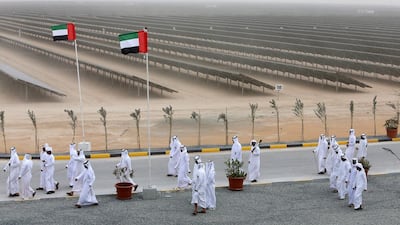Dubai Electricity and Water Authority signed an agreement to add another 250 megawatt capacity to the fourth phase of the Mohammed bin Rashid Al Maktoum Solar Park, one of the largest concentrated solar power projects in the world.
The amendment to the power purchase agreement with Saudi Arabian Acwa Power, which is leading the execution of the fourth phase of the solar project, will raise the total installed power capacity to 950MW.
The developers would install solar panels with a collective capacity of 250MW at a cost of 2.4 US cents per kilowatt hour, one of the world’s lowest, the Dubai government's media office said.
A consortium of Acwa and China's Shanghai Power, had submitted low bids to generate electricity at 7.3 US cents per kilowatt an hour for the phase.
Mohammed bin Rashid Al Maktoum Solar Park is one the region’s most ambitious renewable energy projects, and will have 5,000MW installed capacity by 2030. The complex is expected to be the largest single-site solar park in the world built on the basis of an independent power producer (IPP) model.
An IPP is an entity that generates power for sale to a public utility. Dubai currently meets 4 per cent of its power needs from solar and the remainder from natural gas. The emirate targets generating 25 per cent of its energy needs from clean resources by 2020, which it wants to scale up to 75 per cent by 2050. The latest capacity addition to the project would raise the total investment in the park to Dh16 billion, according to the government.
___________
Read more:
Dubai to tender 300MW solar plant by the beginning of 2019
Concentrated solar power projects to accelerate in the Mena region: BMI report
___________
The project will combine three technologies - a 600MW parabolic basin complex, a 100MW solar tower as well as 250MW of photovoltaic panels.
In May, the solar park opened the first part of its phase three - a scheme under the execution of Abu Dhabi's Masdar and France's EDF Group, with the completion date set for 2020. In an interview during the launch, Saeed Al Tayer, managing director and chief executive of Dewa, confirmed plans for the addition of more CSP capabilities.
He had said at the time that a 300MW CSP plant would be tendered before the first quarter of next year, exceeding the scheme’s targeted installed capacity of 1,000MW by 2020.
The UAE plans to meet 7 per cent of its power needs from solar during that period.
CSP technology, which generates energy from the sun by using mirrors and lenses spread over large areas, is receiving a considerable uptake in the region due to falling costs.
Countries with high solar irradiation such as the UAE and Oman as well as Morocco are at the forefront of adapting to this technology, according to a note by Fitch Solutions consultancy.
CSP differs from PV technology in that the energy it produces is easier to be stored, but the latter has historically been cheaper and easy to use.
Worldwide, CSP solar capacity currently makes up only 8 per cent of total capacity collated, while PV solar power dominates the market due to its easy installation, particularly for small and large-scale projects, according to Fitch Solutions.


